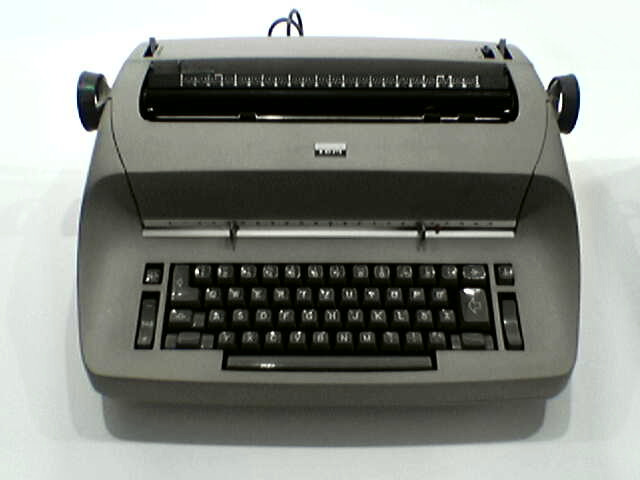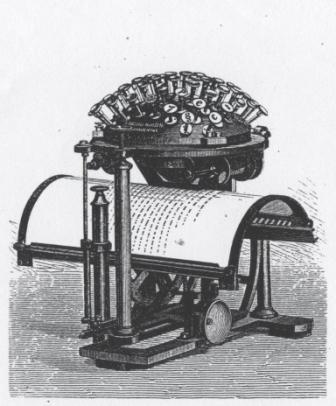Okay, okay, I know: I need to chill out about typewriters. But I’m really enjoying the book by Friedrich Kittler that I mentioned last week, Gramaphone, Film, Typewriter. In particular I want to look at this question that Kittler raises many times: how does the way we write affect what we write?
 Of course, many of us at the UCWbL believe writing is a good way to explore what we believe. But let’s look at the act of writing through a wider lens, and examine some of the material features of writing. For instance, when I blog, I’m interacting not only with the machinery of the computer, but with the Internet, too–including the fiber-optic signal systems, telecom networks, and probably a corporately owned ISP, that make it all work. This interaction differs from putting a pen to paper, and that difference affects how I compose. After all, if it weren’t for WordPress’ text editor window, I probably wouldn’t have looked back at what I had and decided to insert this paragraph to clarify what I mean by my original question, “does the way we write make a difference in how we think?”
Of course, many of us at the UCWbL believe writing is a good way to explore what we believe. But let’s look at the act of writing through a wider lens, and examine some of the material features of writing. For instance, when I blog, I’m interacting not only with the machinery of the computer, but with the Internet, too–including the fiber-optic signal systems, telecom networks, and probably a corporately owned ISP, that make it all work. This interaction differs from putting a pen to paper, and that difference affects how I compose. After all, if it weren’t for WordPress’ text editor window, I probably wouldn’t have looked back at what I had and decided to insert this paragraph to clarify what I mean by my original question, “does the way we write make a difference in how we think?”
It’s pretty clear by now that at least I believe it does matter. A guy named Friedrich Nietzsche would seem to agree. “Our writing tools are also working on our thoughts,” he writes in a letter to his friend Paul Gast. In 1882, the recent invention of the typewriter had allowed Nietzsche to continue writing even after he suffered blindness. But his readers could notice a change. Nietzsche the typist spent less time on argument, and more time on aphorism. Being unable to read due to his failing eyesight, it makes sense that Nietzsche began favoring rhetoric that operated independently, without reference to other texts and thinkers. Yet it’s the typewriter that allowed him to do so.
 I’m not going to speculate as to why so many Germans were preoccupied with the “meaning” of the typewriter (that’s for another blog to take up), but next we find Martin Heidegger tackling the very same question both Nietzsche and I are contemplating. What happens, he asks, when we introduce a mechanical medium like the typewriter between the human hand and the word? Does it disconnect our thinking from our writing? “The machine appears, i.e., technology appears … almost quotidian,” Heidegger concludes, “and hence unnoticed … [in] relation to writing.”
I’m not going to speculate as to why so many Germans were preoccupied with the “meaning” of the typewriter (that’s for another blog to take up), but next we find Martin Heidegger tackling the very same question both Nietzsche and I are contemplating. What happens, he asks, when we introduce a mechanical medium like the typewriter between the human hand and the word? Does it disconnect our thinking from our writing? “The machine appears, i.e., technology appears … almost quotidian,” Heidegger concludes, “and hence unnoticed … [in] relation to writing.”
Heidegger suggests that a machines like typewriters or computers split us from the human essence of our words, which makes sense to a point. There was a time in Western civilization when it was widely believed that mastering handwriting offered spiritual benefits to one’s soul. If that was still the assumption, I would understand Heidegger’s distress. But just as I did last week, I’ll point to the Beat Generation writers as a worthwhile illustration of the opposite: that typing can indeed bring us nearer to our words. “First thought, best thought,” Allen Ginsberg always insisted to other poets, by which he means that the raw, unfiltered image is always the best option. Now I’m not sure that’s always true, Allen, but whether or not you’re correct, I think this pursuit of spontaneity would be difficult (not to mention illegible) without a writing machine at our disposal for us to type away madly and without interruption. Here, it’s technology that gives us access to the unmediated word.
I don’t think any of this will make much of a difference to how I compose: I’m pretty set upon using my computer to draft. But as if I didn’t already trip myself up enough by overthinking what I’m going to write, now I have all this media theory to worry about. Maybe Kittler and I are through with one another.
Discover more from UCWbLing
Subscribe to get the latest posts sent to your email.
